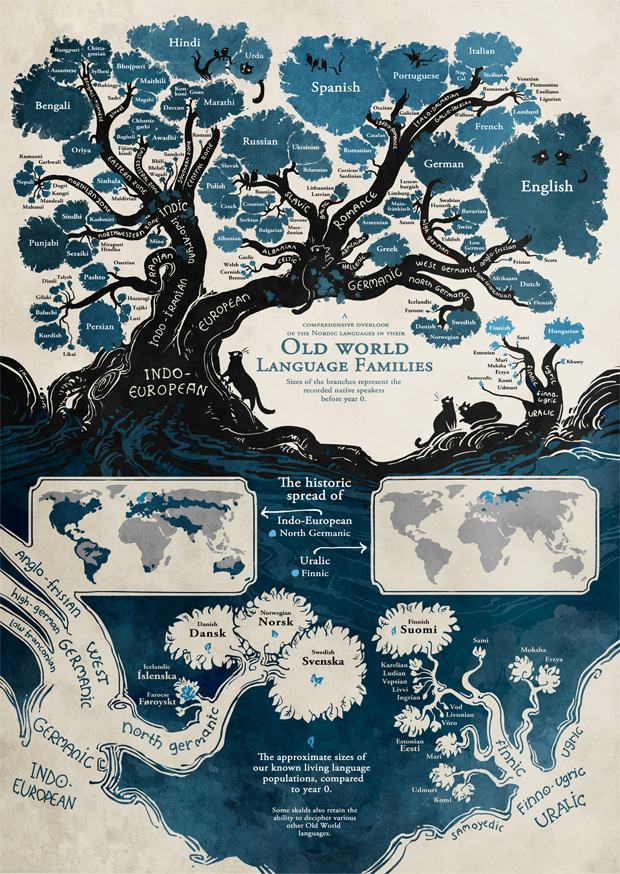36
By the end of this chapter, you will be able to:
- Understand why English grammar is difficult but essential. (GEO 2; SLO 5)
Why is grammar important?

Take a moment and try to imagine a world without language: written, signed, or spoken. It’s pretty hard to conceptualize, right? Language is a constant presence all around us. It’s how we communicate with others; without language, it would be incredibly difficult to connect people.
Many people are self-conscious of their speech and worry that the way they talk is incorrect: this simply isn’t true. There are several different types of English—all of which are equally dynamic and complex. However, each variety is appropriate in different situations. When you’re talking to your friends, you should use slang and cultural references—if you speak in formal language, you can easily come off as uptight or rude. If you’re sending a quick casual message—via social media or texting—you don’t need to worry too much about capitalization or strict punctuation. Feel free to have five exclamation points standing alone, if that gets your point across.
However, there’s this thing called Standard American English. This type of English exists for the sake of communication across cultural lines, where standardized rules and conventions are necessary. How many times have you heard people of older generations ask just what smh or rn mean? This is where grammar comes in. Grammar is a set of rules and conventions that dictate how Standard American English works. These rules are simply tools that speakers of a language can use. When you learn how to use the language, you can craft your message to communicate exactly what you want to convey.
Additionally, when you speak or write with poor grammar, others will often make judgments about who you are as a person. As authors Joseph Williams and Gregory G. Colomb wrote, “Follow all the rules all the time because sometime, someone will criticize you for something.”
Code switching is the ability to use two different varieties (or dialects) of the same language. Most people do this instinctively. If you were writing a paper, you might say something like “The experiment requires not one but four different procedures” in order to emphasize number. In an informal online setting, on the other hand, you might say something like “I saw two (2) buses drive past.” The most important facet of code switching is knowing when to use which variety.
In formal academic writing, standardized English is the correct variety to use.
As you go through this section, remember that these are the rules for just one type of English.
History of the English Language




Why you should learn grammar
People have been learning grammar for almost as long as language has existed. In ancient Greece and Rome, students learned grammar as part of their studies in rhetoric. In medieval times, grammar was considered one of the seven liberal arts. Although the methods for learning grammar have changed drastically over time, the reasons for doing so have not.
Grammar is important because it is the language that makes it possible for us to talk about language. Grammar names the types of words and word groups that make up sentences not only in English but in any language. As human beings, we can put sentences together even as children — we can all do grammar. But to be able to talk about how sentences are built, about the types of words and word groups that make up sentences — that is knowing about grammar. And knowing about grammar offers a window into the human mind and into our amazingly complex mental capacity.
People associate grammar with errors and correctness. But knowing about grammar also helps us understand what makes sentences and paragraphs clear and interesting and precise. Grammar can be part of literature discussions, when we and our students closely read the sentences in poetry and stories. And knowing about grammar means finding out that all languages and all dialects follow grammatical patterns.
Teaching grammar will not make writing errors go away. Students make errors in the process of learning, and as they learn about writing, they often make new errors, not necessarily fewer ones. But knowing basic grammatical terminology does provide students with a tool for thinking about and discussing sentences. And lots of discussion of language, along with lots of reading and lots of writing, are the three ingredients for helping students write in accordance with the conventions of standard English.
Grammar Resources
- Hoonuit (available on Blackboard): Grammar 101 and Word Study video series
- Your Dictionary
- Guide to Grammar and Writing from the Capital Community College Fund
- Interactive Grammar Practice from the Capital Community College Fund
- Grammarly
- Glossary of Correct Usage from English Daily
- How to Edit an English Essay from Paradigm
The whole system and structure of a language or of languages in general, usually taken as consisting of syntax and morphology (including inflections) and sometimes also phonology and semantics.
The ability to use two different varieties (or dialects) of the same language
A particular form of a language which is peculiar to a specific region or social group.
Of or denoting a style of writing or public speaking characterized by more elaborate grammatical structures and more conservative and technical vocabulary.
